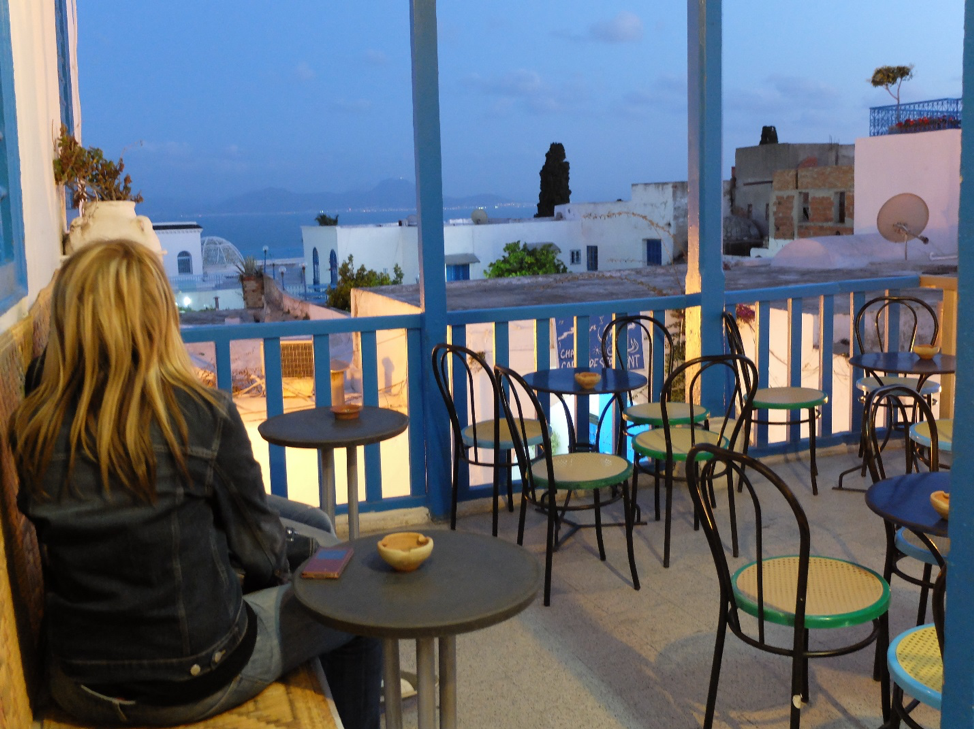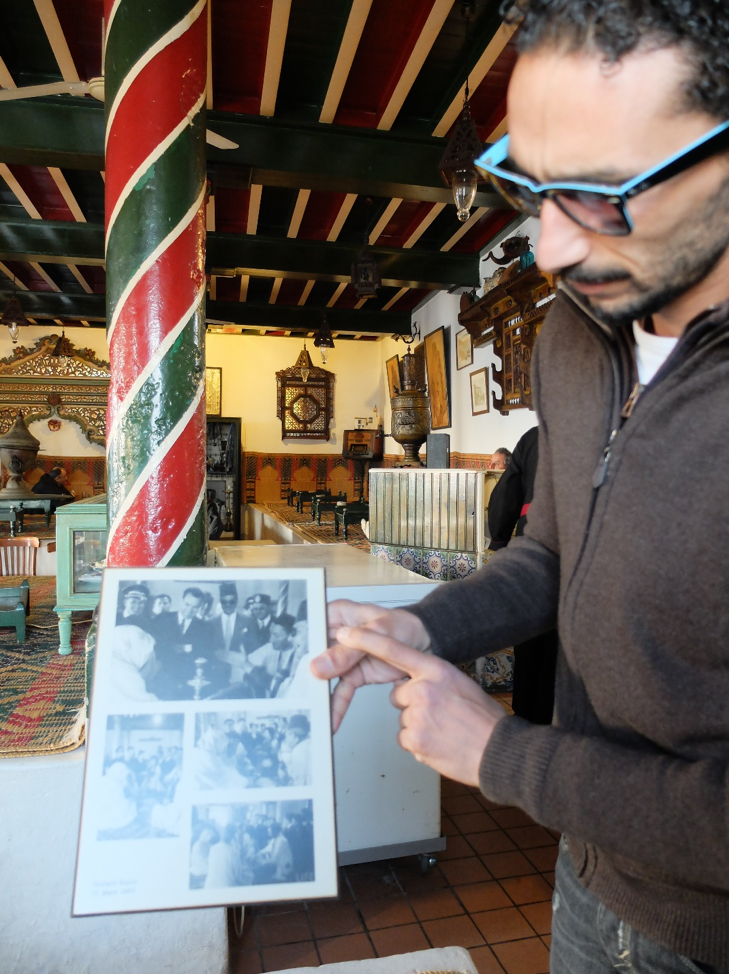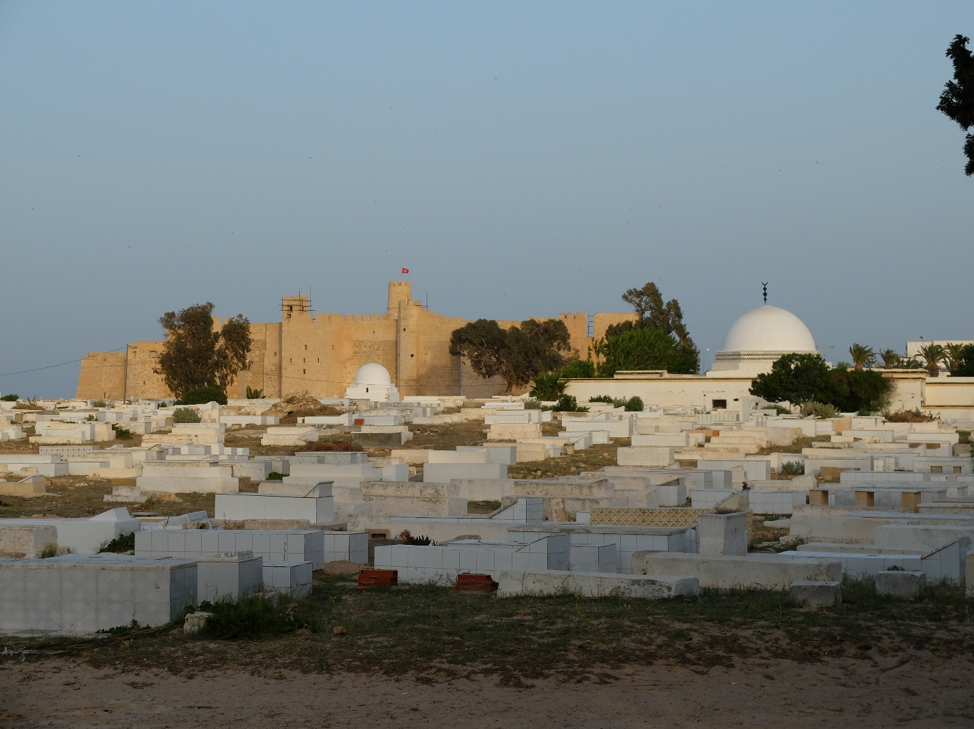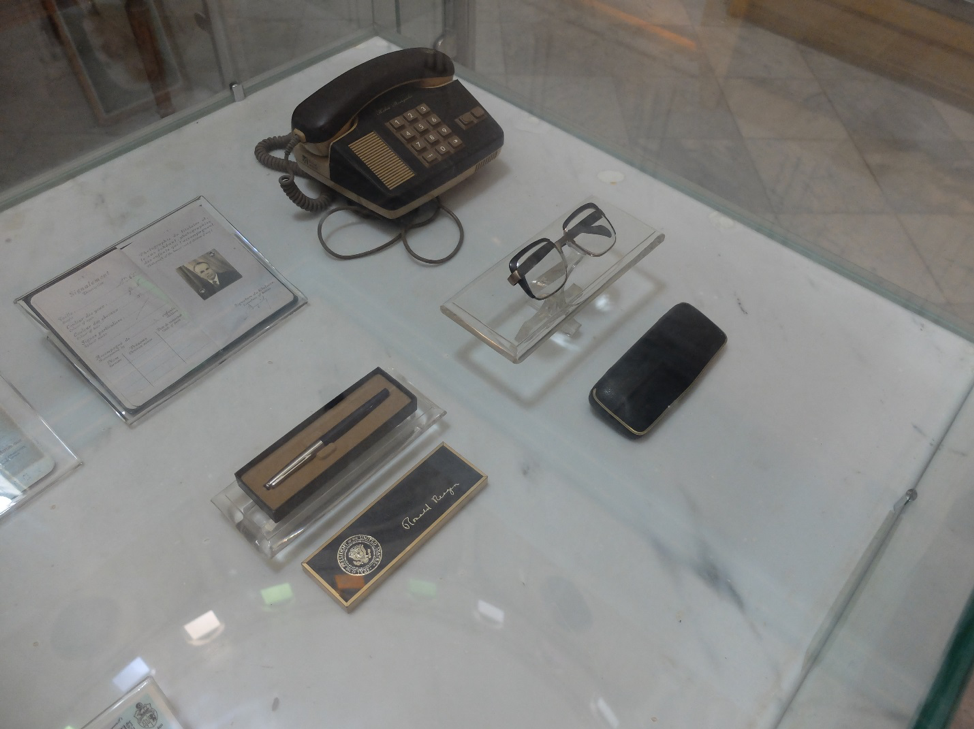
The waterfront of the Tunisian town of Monastir is dominated by two imposing structures. One stands close to the windy shores of the Mediterranean: This is the Ribaat, a beautifully preserved Islamic fortress that has been used as a biblical setting for serious films about Jesus as well as the whimsical (Monthy Python’s The Life of Bryan were filmed here).

The other imposing structure is across the street, an equally beautiful building of white marble with green touches, capped with a golden dome; the Bourguiba family Mausoleum. Two 20 metre tall minarets flank the dome in imitation of a mosque.

As the building’s overseer leaves sharply at sunset, Mohammed, the night guard, begins to turn away potential visitors. But once his boss is out of ear range, he changes his tune, “My friends, my friends wait just a moment” he calls, offering to show a young couple the mausoleum on an unofficial tour “for friends” in return for a tip. Inside, he turns on the massive chandelier whose glow is reflected into scores of alcoves each with careful gold tiles all surrounding the white tomb of Tunisia’s first President. Bourguiba’s tomb is empty. He was buried in a simple shroud under the tomb in a style similar to Kemal Attaturk, the Turkish dictator and secularist whom Bourguiba modelled himself after.

Bourguiba ruled Tunisia from 1957 to 1987 when his erratic political moves, allegedly the cause of a declining mental health condition, lead to a bloodless coup. The coup was lead by Ben Ali – an upstart Prime Minister who had only served two months in office. Ben Ali would rule the country until uprisings in 2011. Yet, Habib Bourguiba’s legacy remains very much alive. It is not uncommon to find Tunisian press singing his praises, even today, and in a recent trip to Tunisia, Algerian Prime Minister Abdelmalek Sellal praised the “solid foundation” Bourguiba had left Tunisia. On April 6th, 2000 Bourguiba died and in giving a televised adress, a nation noticed Ben Ali’s awkward eulogy. This sparked anti-Ben Ali riots, the first in the country’s history and a dress rehearsal for 2011.
Bourguiba’s career also marked the high-water mark of Arab socialism’s attempt to secularize the Arab world. Bourguiba famously argued Tunisians needn’t fast during Ramadan, quoting the Prophet Muhammad in exhorting Tunisians to “Break the fast, and you will be stronger to confront the enemy”. This proved unsuccessful but, other efforts to improve the status of women and to urbanize the population proved more successful.
Habib Bourguiba was born in Monastir, the same town where his mausoleum now sits. Born in 1903 he was the youngest of eight brothers and sisters; he showed early promise and attended “Colege Sadiki”, a bilingaul lycée in Tunis where he was exposed to ideas which would come to influence his life: secularism, constitutionalism, and anti-imperialism. The lycee still stands and its domes and a minaret are built in a style similar to that used for Bourguiba’s mausoleum. It was on the steps of this lycee that Bourguiba would later proclaim in 1958 that all secondary education in Tunisia would be taught in Arabic, notFrench.
It was also here that Bourguiba first learned to love French culture while despising the French occupation of Tunisia. “I hate colonialism, not the French,” he remarked a few months after seizing power in 1957. While studying law the Sorbonnein Paris met his first wife, a French woman who was his landlord. Mathilde Lorrainconverted to Islam and bore him a son.
In the 1930s, he was imprisoned for anti-colonial agitating in Tunisia. As a prisoner he was moved to France at the start of World War II. He was sprung from jail by the Axis powers who captured France in 1940. Despite efforts by the Nazis and Italian Fascist to woo him, he remained committed to Tunisian independence from France, not becoming a Nazi puppet. He returned to Tunisia on April 7, 1943 believing the Axis cause was doomed.
Yet, the end of the war did not bring Tunisian independence. So Bourguiba, then still in his early 40s, went discreetly to the port of Sfax in central Tunisia. Today Sfax is an industrial port city its skyline dominated by smokestacks and shipping cranes. The city’s industrial odour can be difficult to escape. This is in no small part due to the industrialization campaign initiated by Bourguiba when he was president.
In 1945, the city was still dominated by its historical medina, one of the best preserved in Tunisia. The town also boasted a vibrant Jewish community with the Jews of Sfax. It was here that Max Azria the founder of the BCBG fashion house was born in 1949, as the city’s Jews were building their last synagogue just outside of a corner of the medina. The synagogue is now rarely used as most Tunisian Jews have fled abroad locals told me. This hasn’t spared it from anti-Semitic graffiti. In Sfax, no one seemed to remember where exactly, Bourguiba had discreetly boarded a fishing boat in 1945 to be smuggled abroad. The city’s Soviet-style heavy industry appears to be the only mark he has left on the city, it is hard to imagine a fashion icon like Max Azria could ever have been born here. Today historic cafes downtown serve spicy soujuk sandwiches and Turkish coffee. Might Bourguiba have enjoyed his favourite Tunisian dishes last time before four years of exile in Egypt? For modern travellers with more time, there is Cafe Diwan which until 1881 was a Bourj Al Resace a defensive tower and now offers shisha or drinks to visitors who come to gaze over the medina.
Despite the shelter provided to him by the King of Egypt, Bourguiba would have had little use for the traditional monarchy in Tunisia when he returned in 1949. Soon after independence in 1956 he ousted the monarchy in a coup. Historic homes across the country once owned by members of the traditional Tunisian ruling class now serve a commercial purpose. Some are now boutique hotels, restaurants, or carpet shops aimed at tourists.

Perhaps the best known of these in Tunisia is a fine dining establishment: Restaurant Essaraya. A photo on the wall of the restaurant shows a young Bourguiba discussing policy with Tunisian notables in 1940. Bourguiba would dine here again after independence. Today, the elegant Ottoman style house still manages to attract potentates. Ben Ali entertained his cronies and United Nation’s Secretary General Kofi Annan also ate here once. But, the maitre dea man named Al Kurdi, explains that for him, the most memorable night came when Prince Ibn Tala Al Saud of Saudi Arabia visited. “He sat over there” Al Kurdi explains “passing out 100 dollars bills to everyone that passed by”. The house has been immaculately well preserved and, between courses, patrons can wander about its levels and onto the roof for a glimpse over the neatly packed casbah.

For his own home, Bourguiba built a palace, symbolically on a hill above the ruins of Carthage, in a bid to suggest the Tunisian state was the new Carthage. Bourguiba also frequented the Café des Nattes in Sidi Bou Said. The hill top café, which opened in the late 1700s, is a Tunisian institution par none, serving guests glasses of whisky coloured green tea with mint, a few pine nuts floating atop.
Bourguiba was hardly its most famous visitor. Richard Nixon, then a glob trotting Vice President, visited in 1957. Jean Paul Sarte and Simone de Beauvoirscribbled philosophy and poetry in a corner, while Arab megastars like Abdul Halim Hafez and Umm Kulthum soaked up the historic vibes. Albert Camus also took in the view, a view where once thousands of years ago proud Carthaginians stood watching Hannibal and the Barcid clan set sail to make war upon Rome.

Max who manages the café is the 6thgeneration to work there. A photo, in one corner, shows his great grandfather on the steps in 1894. Only in his 30s, he is young enough to have met Michael Jackson, who once performed in Tunis as well as James Brown and Tina Turner; “When Jackson came, it was a big event. He had 20 or 30 with him.” There isn’t really any food options but, sitting next to an open window, I smelt the most amazing hint of something sugary wafting through the air. I went exploring and found a cave literally underneath Café De Nantes serving delicious fresh donuts. I took one upstairs to enjoy with my tea, view, and sheesha. Max did not seem to mind.

Bourguiba leaned to play up the exoticism of the nation to foreign visitors like Nixon. Nixon was greeted by a crowd of 250,000 and a state room at the Art Noveau Hotel Majestic, which still stands, in downtown Tunis. Bourguiba also dispatched, both his foreign and defence minister, to usher Nixon to Café Des Nattes.
Yet, Nixon wasn’t the only American leader charmed by Bourguiba. Ronald Reagan, who met with Bourguiba in the 1980s, received a hand woven carpet from Kairouan and Reagan returned the gesture by giving Bourguiba a black and silver pen. The pen is now part of the mausoleum in Monastir. Cold War politics ensured that Bourguiba’s short comings like the brutal suppression of political riots in 1977 were neatly overlooked.
Though in 1980 Bourguiba had hinted at willingness for multiparty elections, the modern view is as early as 1969 [JH1] Bourguiba was increasingly pushed aside in the daily management of the state.
In 1986, Ben Ali seized power soon after surrounding the palace and getting a medical order stating the President was incapacitated. Bourguiba refused to leave his Carthaginian palace for several days. Yet, overnight Bourguiba’s image was taken down and his August 3rd birthday was no longer celebrated as a holiday. He spent the rest of his life under house arrest, at times peacefully reading poetry in the garden, at others demanding to be accepted as the nation’s president. Ironically, Bourguiba had placed Muhammed VIII al Amin, Bey of Tunisia, under a similar house arrest. But, while the last Bey of Tunisia spent less than 5 years under house arrest before he died in 1962, Bourguiba spent 13 years as a prisoner in his own Monastir. A surprising fate for a man who had once travelled the globe meeting world leaders and in 1980 hosted the Queen of England.
[JH2] Over time, the Ben Ali regime became increasingly brutal and began to concern American officials. The end of the Cold War meant that supporting anti-communist dictators was less important. “We were really concerned by the excesses of the regime, he was eager to buy stun guns and other gear but, we were worried they would be used for torture” says a former US Foreign Service officer who worked to block Ben Ali’s purchase of US police weapons and stun guns on humanitarian ground. The largesse of the regime concerned the Tunisian people after the revolution in Tunisia in 2011 some 214 businesses with combined assets of $13 billion were seized by the state. These included 550 [JH3] properties and some 48 boats and yachts.
Two days after his death Bourguiba was laid to rest in the mausoleum in Monastir, the anti-Ben Ali riots his death sparked across Tunisia perhaps his final gift to the country. The final room in the mausoleum shows Bourguiba with a host of Arab leaders ranging from Egypt’s President Nasser to Libya’s Muammar Ghaddafi. The black pen Ronald Reagan gave him and an acrylic pair of eye glasses are in a display case. Yet, the room is dominated by the former President’s desk. Mohammed, who has worked as a caretaker at the facility for the last nine years, opens a small gate and lets guests sit at Bourguiba’s desk while he snaps photos and then gleefully accepts his tips.
[JH1]http://www.tunisia-live.net/2013/04/09/reflecting-on-bourguiba-13-years-after-his-death/
[JH2]http://articles.latimes.com/1988-02-13/news/mn-10859_1_house-arrest
[JH3]The Economist October “Crony Capitalism: Friends in high places”


“During the revolution people stopped coming here but, now they are coming again. Tunisians will always come, they love Bourguiba” Mohammed explains. It is hard to know if his own love for Bourguiba is political or driven by his desire to line his pocketbook with after hours tours. Indeed as we leave, I look back to see Mohammed already beginning another impromptu tour.
- Did You Know The Roman Colosseum Was Built With Treasure Stolen From The Second Temple Of Jerusalem?
- Exhibition Dedicated To Tsar Nicholas I Opens In St. Petersburg

